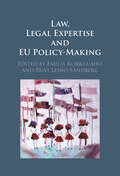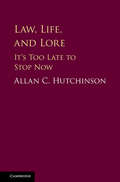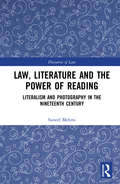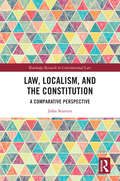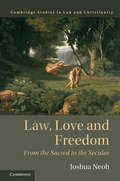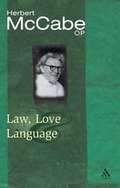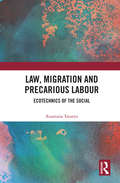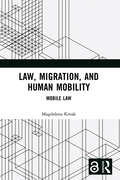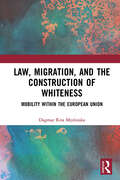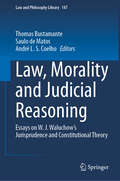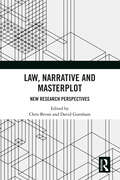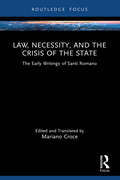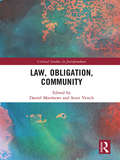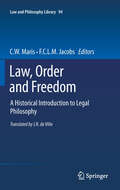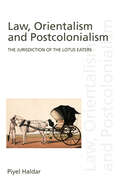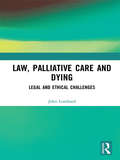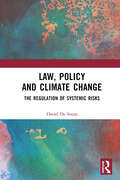- Table View
- List View
Law, Legal Expertise and EU Policy-Making
by Päivi Leino-Sandberg Emilia Korkea-AhoThis edited collection examines the changing role of the legal profession as experts in the context of European Union policy-making. Drawing on theoretical and empirical research and the idea of law as a social and political practice, this socio-legal work brings together a group of legal scholars and political scientists to investigate how lawyers, through the deployment of their expertise and knowledge, act as experts in matters of EU related policy-making at the national, European and international levels. It provides new theoretical viewpoints and untold stories from legal experts themselves, promotes an evolving definition of what constitutes legal expertise and what shapes legal experts in a time when experts are in equal measure both revered and ignored, and introduces new critical voices in the field of EU socio-legal studies.
Law, Legislation and Liberty, Volume 1: Rules and Order
by Friedrich A. HayekThis volume represents the first section of comprehensive three-part study of the relations between law and liberty. Rules and Order constructs the framework necessary for a critical analysis of prevailing theories of justice and of the conditions which a constitution securing personal liberty would have to satisfy.
Law, Liberty and State
by Thomas Poole David Dyzenhaus Dyzenhaus, David and Poole, Thomas"Oakeshott, Hayek and Schmitt are associated with a conservative reaction to the 'progressive' forces of the twentieth century. Each was an acute analyst of the juristic form of the modern state and the relationship of that form to the idea of liberty under a system of public, general law. Hayek had the highest regard for Schmitt's understanding of the rule of law state despite Schmitt's hostility to it, and he owed the distinction he drew in his own work between a purpose-governed form of state and a law-governed form to Oakeshott. However, the three have until now rarely been considered together, something which will be ever more apparent as political theorists, lawyers and theorists of international relations turn to the foundational texts of twentieth-century thought at a time when debate about liberal democratic theory might appear to have run out of steam"--
Law, Liberty, and the Rule of Law
by Imer B. Flores Kenneth E. HimmaIn recent years, there has been a substantial increase in concern for the rule of law. Not only have there been a multitude of articles and books on the essence, nature, scope and limitation of the law, but citizens, elected officials, law enforcement officers and the judiciary have all been actively engaged in this debate. Thus, the concept of the rule of law is as multifaceted and contested as it's ever been, and this book explores the essence of that concept, including its core principles, its rules, and the necessity of defining, or even redefining, the basic concept. Law, Liberty, and the Rule of Law offers timely and unique insights on numerous themes relevant to the rule of law. It discusses in detail the proper scope and limitations of adjudication and legislation, including the challenges not only of limiting legislative and executive power via judicial review but also of restraining active judicial lawmaking while simultaneously guaranteeing an independent judiciary interested in maintaining a balance of power. It also addresses the relationship not only between the rule of law, human rights and separation of powers but also the rule of law, constitutionalism and democracy.
Law, Life, and Lore: It's Too Late to Stop Now
by Allan C. HutchinsonLaw is best interpreted in the context of the traditions and cultures that have shaped its development, implementation, and acceptance. However, these can never be assessed truly objectively: individual interpreters of legal theory need to reflect on how their own experiences create the framework within which they understand legal concepts. Theory is not separate from practice, but one kind of practice. It is rooted in the world, even if it is not grounded by it. In this highly original volume, Allan C. Hutchinson takes up the challenge of self-reflection about how his upbringing, education, and scholarship contributed to his legal insights and analysis. Through this honest examination of key episodes in his own life and work, Hutchinson produces unique interpretations of fundamental legal concepts. This book is required reading for every lawyer or legal scholar who wants to analyse critically where he or she stands when they practice and study law.
Law, Life, and the Teaching of Legal History: Essays in Honour of G. Blaine Baker
by Ian C. Pilarczyk, Angela Fernandez, and Brian YoungAs the leading legal historian of his generation in Canada and professor at McGill University for thirty-five years, Blaine Baker (1952–2018) was known for his unique personality, teaching style, intellectual cosmopolitanism, and deep commitment to the place of Canadian legal history in the curriculum of law faculties.Law, Life, and the Teaching of Legal History examines important themes in Canadian legal history through the prism of Baker’s career. Essays discuss Baker’s own research, his influence within McGill’s law faculty, his complex personality, and the relationship between the private and the public in the life of a university intellectual at the turn of the twenty-first century. Inspired by topics Baker took up in his own writing, contributors use Baker’s broad interests in legal culture to reflect on fundamental themes across Canadian legal history, including legal education, gender and race, technology, nation building and national identity, criminal law and marginalized populations, and constitutionalism.Law, Life, and the Teaching of Legal History offers a contemporary analysis of Canadian legal history and thoughtfully engages with what it means to honour one individual’s enduring legacy in the study of law.
Law, Literature and the Power of Reading: Literalism and Photography in the Nineteenth Century
by Suneel MehmiAt the intersection of law, literature and history, this book interrogates how a dominant contemporary idea of law emerged out of specific ideas of reading in the nineteenth century. Reading shapes our identities. How we read shapes who we are. Reading also shapes our conceptions of what the law is, because the law is also a practice of reading. Focusing on the works of key Victorian writers closely associated with legal practice, this book addresses the way in which the identity of the reader of law has been modelled on the identity of the political elite. At the same time, it shows how other readers of law have been marginalized. The book thus shows how a construction of the law has emerged from the ordering of a power that discriminates between different readers and readings. More specifically, and in response to the emerging media of photography – and, with it, potentially subversive ideas of exposure and visibility – the book shows that there have been dominant, hidden and unrecognised guides to legal reading and to legal thought. And in making these visible, the book also aims to make them contestable. This secret history of law will appeal to legal historians, legal theorists, those working at the intersection of law and literature and others with interests in law and the visual.
Law, Literature, and Violence Against Women: Ending the Victim Blame Game
by Erin L. KelleyThis book engages legal and literary texts in order to examine acquaintance crimes, such as rape, sexual harassment, stalking, and domestic abuse, and to challenge how the victim’s physical or psychological "freeze response" is commonly and inaccurately mistaken for her consent.Following increased interest in the #MeToo movement and the discoveries of sexual abuse by numerous public figures, this book analyzes themes in law and literature that discredit victims and protect wrongdoers. Interpreting a present-day novel alongside legislation and written court cases, each chapter pairs a fictional text with a nonfictional counterpart. In these pairings, the themes, events, and arguments of each are carefully unpacked and compared against one another. As the cross-readings unfold, we learn that a victim does not "ask for it," and she should not arouse suspicions just because she does not fight, run away, or report the crime. Instead, and as this book demonstrates, the more common and most practical response is to become physically and mentally paralyzed by fear; the victim dissociates, shuts down, and remains stuck in the fright and captivity of abuse.This book will interest scholars and students working in, and especially at the intersection of, law, literature, gender studies, and criminology.
Law, Localism, and the Constitution: A Comparative Perspective (Routledge Research in Constitutional Law)
by John StantonLocal government affects us all. Wherever we live, in towns, cities, villages or in the smallest of communities, there are locally elected councils tasked with representing people’s interests in the running of the local area. This involves, inter alia, providing public services, maintaining local spaces and acting as a level of democratic governance within the broader constitutional and executive structure of the state. To fulfil these responsibilities, though, local government must be democratically legitimate; it must have at its disposal reasonable means and resources to function; and it must enjoy a healthy and balanced relationship with central government. This book explores and analyses the extent to which local government in the different parts of the UK is able to function effectively and democratically. It draws from local councillors’ views in analysing the state of local government under the current constitutional and governmental arrangements, discussing issues such as councils’ relationship with central government; citizen engagement; finance and public services; and the impact of recent reforms. It contrasts and compares the different approaches adopted in England, Scotland, Wales and Northern Ireland, also setting out and discussing possible reforms of local government in the United Kingdom. While the focus is on the UK, the work includes a comparison with other relevant jurisdictions.
Law, Love and Freedom: From the Sacred to the Secular (Law and Christianity)
by Joshua NeohHow does one lead a life of law, love, and freedom? This inquiry has very deep roots in the Judeo-Christian tradition. Indeed, the divergent answers to this inquiry mark the transition from Judeo to Christian. This book returns to those roots to trace the twists and turns that these ideas have taken as they move from the sacred to the secular. It relates our most important mode of social organization, law, to two of our most cherished values, love and freedom. In this book, Joshua Neoh sketches the moral vision that underlies our modern legal order and traces our secular legal ideas (constitutionalism versus anarchism) to their theological origins (monasticism versus antinomianism). Law, Love, and Freedom brings together a diverse cast of characters, including Paul and Luther, Augustine and Aquinas, monks and Gnostics, and constitutionalists and anarchists. This book is valuable to any lawyers, philosophers, theologians and historians, who are interested in law as a humanistic discipline.
Law, Love and Language
by Herbert MccabeWhat is ethics all about? In this book Herbert McCabe suggests that it is about loving, obeying laws and talking to people. In doing so, he offers an introduction to ethical thinking for anyone with a serious interest in moral philosophy. He does so as someone who writes with a Christian audience in mind. Most of his arguments, however, do not presuppose a believing Christian readership.
Law, Memory, Violence: Uncovering the Counter-Archive
by Stewart Motha Honni Van RijswijkThe demand for recognition, responsibility, and reparations is regularly invoked in the wake of colonialism, genocide, and mass violence: there can be no victims without recognition, no perpetrators without responsibility, and no justice without reparations. Or so it seems from law’s limited repertoire for assembling the archive after ‘the disaster’. Archival and memorial practices are central to contexts where transitional justice, addressing historical wrongs, or reparations are at stake. The archive serves as a repository or ‘storehouse’ of what needs to be gathered and recognised so that it can be left behind in order to inaugurate the future. The archive manifests law’s authority and its troubled conscience. It is an indispensable part of the liberal legal response to biopolitical violence. This collection challenges established approaches to transitional justice by opening up new dialogues about the problem of assembling law’s archive. The volume presents research drawn from multiple jurisdictions that address the following questions. What resists being archived? What spaces and practices of memory - conscious and unconscious - undo legal and sovereign alibis and confessions? And what narrative forms expose the limits of responsibility, recognition, and reparations? By treating the law as an ‘archive’, this book traces the failure of universalised categories such as 'perpetrator', 'victim', 'responsibility', and 'innocence,' posited by the liberal legal state. It thereby uncovers law’s counter-archive as a challenge to established forms of representing and responding to violence.
Law, Migration and Precarious Labour: Ecotechnics of the Social
by Anastasia TatarynProviding a radical new approach to labour migration, this book challenges the prevailing legal and political construction of the figure of the irregular migrant labourer, whilst at the same time reimagining this irregularity as the basis of an alternative, post-capitalist, sociality. The text draws on the work of contemporary philosopher Jean-Luc Nancy, and more specifically his term ‘ecotechnics’, in order to examine how economic, political, and juridical norms deny the full legal status of certain people who are deemed to be irregular. This ostensible irregularity is revealed as a regular feature of labour market practice, and a necessary support for the conceptual foundations of capitalist legality. As this book shows, however, this legality – and with it, the technological subordination of life to the circulation of capital as if this were the only possibility for our being in the world – is not insurmountable. The book’s consideration of the figure of the irregular migrant labourer comes to provide an alternative basis for reimagining our relationship not only with migration and with labour itself, but ultimately with each other. This powerful analysis of contemporary labour migration is of considerable interest to legal and political theorists, philosophers, labour lawyers, migration experts, and others with theoretical, political, or policy interests in this area.
Law, Migration, and Human Mobility: Mobile Law
by Magdalena KmakThis book analyses the multifaceted ways law operates in the context of human mobility, as well as the ways in which human mobility affects law. Migration law is conventionally understood as a tool to regulate human movement across borders, and to define the rights and limits related to this movement. But drawing upon the emergence and development of the discipline of mobility studies, this book pushes the idea of migration law towards a more general concept of mobility that encompass the various processes, effects, and consequences of movement in a globalized world. In this respect, the book pursues a shift in perspective on how law is understood. Drawing on the concepts of ‘kinology’ and ‘kinopolitics’ developed by Thomas Nail as well as ‘mobility justice’ developed by Mimi Sheller, the book considers movement and motion as a constructive force behind political and social systems; and hence stability that needs to be explained and justified. Tracing the processes through which static forms, such as state, citizenship, or border, are constructed and how they partake in production of differential mobility, the book challenges the conventional understanding of migration law. More specifically, and in revealing its contingent and unstable nature, the book reveals how human mobility is itself constitutive of law. This interdisciplinary book will appeal to those working in the areas of migration and refugee law, citizenship studies, mobility studies, legal theory, and sociolegal studies. The Open Access version of this book, available at www.taylorfrancis.com, has been made available under a Creative Commons Attribution-Non Commercial-No Derivatives (CC-BY-NC-ND) 4.0 license. Funded by University of Helsinki and Åbo Akademi University.
Law, Migration, and the Construction of Whiteness: Mobility Within the European Union
by Dagmar Rita MyslinskaThis book addresses the hidden dynamics of race within the European Union.Brexit supporters’ frequent targeting of European Union (EU) movers, especially those from Central and Eastern Europe, has been popularly assumed as at odds with the EU project’s foundations based on equality and inclusion. This book dispels that notion. By interrogating the history, wording, omissions, assumptions and applications of laws, policies and discourses pertinent to mobility and equality, the argument developed throughout the book is that the parameters of CEE nationals’ status within the EU have been closely circumscribed, in line with the entrenched historical positioning of the west as superior to the east. Engaging current legal, economic, political and moral issues--against the backdrop of Brexit and contestations over EU integration and globalisation--this work opens avenues of thought to better understand law’s role in producing and sustaining social stratifications. Europe is a postcolonial space, as this book demonstrates. By addressing fractures within the construct of whiteness that are based on ethnicity, class and migrant status, the book also provides a theoretically nuanced, and politically useful, understanding of contemporary European racisms.This book will appeal to scholars, students and others interested in migration, EU integration and EU citizenship, equality law, race and ethnicity, social policy, and postcolonialism.
Law, Modernity, Postmodernity: Legal Change in the Contracting State (Routledge Revivals)
by Brendan EdgeworthThis title was first published in 2003. This book examines the interrelationship between the unravelling of the post-war welfare state and legal change. By reference to theorists of postmodernity such as Zygmunt Bauman, Scott Lash and John Urry, and David Harvey, the principal argument is that contemporary law and legal institutions can be best understood as having changed in ways that mirror the recent transformation of the interventionist welfare state and its Fordist, Keynesian economic infrastructure. The key changes identified in the legal field include:- the shift toward marketized regulatory structures as reflected in privatization and deregulation, the attenuation of welfare rights, the privatization of justice, legal polycentricity, the reconfiguration of the welfare state’s social citizenship and the globalization of law. Empirical evidence from a number of jurisdictions is adduced to indicate the general direction of change.
Law, Morality and Judicial Reasoning: Essays on W. J. Waluchow’s Jurisprudence and Constitutional Theory (Law and Philosophy Library #147)
by Thomas Bustamante Saulo De Matos André L. S. CoelhoThis book provides a critical outlook on, and an inquiry into the practical implications of, the works of Professor W.J. Waluchow, one of the most important jurisprudence scholars of the early twenty-first century, while also reflecting on the interconnections between his legal theory and his theory of constitutional interpretation. It also features an interview with Waluchow, in which he responds to some of the chapters and shares a first-person perspective on his main philosophical ideas, how they emerged, and how they can be further developed and applied. The book makes a valuable contribution to contemporary legal philosophy by asking and providing different answers (from prominent legal philosophers and newer scholars in the field) to questions such as ‘How does Waluchow’s jurisprudence relate to his theories of legal reasoning and constitutional interpretation?’, ‘On what terms should we understand inclusive legal positivism?’, ‘Can inclusive legal positivism be reconciled with an interpretivist theory of adjudication?’, ‘How does it compare with Raz’s model of legal authority?’, ‘Can Waluchow’s notion of “community constitutional morality” be applied to contexts such as international law, pluralist legal communities, and indigenous laws?’, and ‘Is Waluchow’s methodology equipped to provide interpretive directives in unstable and extremely unequal legal systems?’. The chapters, all written by experts on jurisprudence (including some of the scholars who helped develop the tradition known as inclusive legal positivism), offer a unique analysis of Waluchow’s most complex and intriguing theses, providing not only a valuable exegetical analysis of his work but also a range of answers to the challenge of interpreting legal and constitutional values, as well as practical resolutions to persisting controversies in the philosophy of law.
Law, Mystery, and the Humanities
by Diana Majury Logan AtkinsonThe trans-disciplinary study of law and the humanities is becoming a more widespread focus among scholars from a range of disciplines. Complementary in several major ways, concepts and theories of law can be used to formulate fresh ideas about the humanities, and vice versa. Law, Mystery, and the Humanities, a collection of essays by leading scholars, is based on the hypothesis that law has significant contributions to make to ongoing discussions of philosophical issues recurrent in the humanities.The philosophical issues in question include the role of rationality in human experience, the problem of dissent, the persistence of suffering, and the possibility of transcendence. In each of these areas, law is used to add complexity and offer divergent perspectives, thus moving important questions in the humanities forward by introducing the possibility of alternative analysis. Ranging from discussions of detective fiction, Chomsky's universal grammar, the poetry of Margaret Atwood, the Great Plague of London, and more, Law, Mystery, and the Humanities offers a unique examination of trans-disciplinary potential.
Law, Narrative and Masterplot: New Research Perspectives
by David Gurnham Chris BevanThe book brings together a range of socio-legal and law and humanities scholars to elaborate and explore the idea of the legal ‘masterplot’.There is a class of narrative, sometimes referred to as ‘masterplot’ or ‘metanarrative’, that stands above the plethora of other stories, plots, and myths that may be found in law. This book focuses on the masterplot concept as providing a productive yet largely under-explored way of seeing, understanding, and responding to legal controversies and socio-legal problems. Masterplots may be understood as those prevalent and enduring ideas and narratives that form the basis of expectations, assumptions, stereotypes, and prejudices. In legal contexts, masterplots give shape and significance to particular experiences or issues. In aligning with them, legal arguments, judgments, and reforms gain acceptability and can be presented as authoritative, proportionate, and legitimate. Reflecting, from different legal perspectives and subdisciplines, on the masterplots at play in our current legal frameworks, this collection illuminates the often-hidden ways in which law functions.This book will appeal to students and scholars of socio-legal studies, sociology, social policy, and humanities approaches to law.
Law, Necessity, and the Crisis of the State: The Early Writings of Santi Romano (Law and Politics)
by Mariano CroceThis book contains the first English translations of Santi Romano’s important essays, ‘On the Decree Laws and the State of Siege During the Earthquakes in Messina and Reggio Calabria’ (1909) and ‘The Modern State and its Crisis’ (1910). Before Santi Romano wrote his masterpiece The Legal Order in 1917–18, he lay the foundations for his ground-breaking theory of law in these two essays, which are still central to scholarly debates about his legacy. The main focus of ‘On the Decree Laws’ is the concept of necessity as a source of law. Such a controversial view anticipated the much more renowned conception of the state of exception advanced later by Carl Schmitt in his Political Theology and has provided a reference point for Giorgio Agamben. The second essay, ‘The Modern State and its Crisis’, is concerned with the emergence of social forces that the early 20th-century administrative state was struggling to tame. Pursuing an insight that he would develop in The Legal Order, Romano argued that a solution could be found in a public law theory that was able to reconcile the need for a shared constitutional frame with the internal orderings of nonstate movements. Indispensable for contemporary scholars to understand how Romano’s most revolutionary notions came about, as well as to fully appreciate the theoretical import of his concept of law, this book will appeal to legal and political theorists and others who are interested in how law deals and should deal with emergencies and social crises.
Law, Obligation, Community (Critical Studies in Jurisprudence)
by Scott Veitch Daniel MatthewsAgainst an ever-expanding and diversifying ‘rights talk’, this book re-opens the question of obligation from not only legal but also ethical, sociological and political perspectives. Its premise is that obligation has a primacy ahead of rights, because rights attach to practices and modes of being that are already saturated with obligations. Obligations thus lie at the core not just of law but of community. Yet the distinctive meanings, range and situations of obligation have tended to remain under-theorised in legal scholarship. In response, this book examines the sense in which we are multiply ‘bound beings’, to law and legal institutions, as much as we are to place, community, memory and the various social institutions that give shape to collective life. Sharing this set of concerns, each of the international group of scholars contributing to this volume traces the specificity of the binding force of obligations, their techniques and modes of expression, as well as their centrally important role in giving form to lawful relations. Together they provide an innovative and challenging contribution to legal scholarship: one that will also be of relevance to those working in politics, philosophy and social theory.
Law, Order and Freedom
by J.R. de Ville C. W. Maris F.C.L.M. JacobsThe central question in legal philosophy is the relationship between law and morality. The legal systems of many countries around the world have been influenced by the principles of the Enlightenment: freedom, equality and fraternity. The position is similar in relation to the accompanying state ideal of the democratic constitutional state as well as the notion of a welfare state. The foundation of these principles lies in the ideal of individual autonomy. The law must in this view guarantee a social order which secures the equal freedom of all. This freedom is moreover fundamental because in modern pluralistic societies a great diversity of views exist concerning the appropriate way of life. This freedom ideal is however also strongly contested. In Law, Order and Freedom, a historical overview is given pertaining to the question of the extent to which the modern Enlightenment values can serve as the universal foundation of law and society.
Law, Orientalism and Postcolonialism: The Jurisdiction of the Lotus-Eaters
by Piyel HaldarFocusing on the ‘problem’ of pleasure Law, Orientalism and Postcolonialism uncovers the organizing principles by which the legal subject was colonized. That occidental law was complicit in colonial expansion is obvious. What remains to be addressed, however, is the manner in which law and legal discourse sought to colonize individual subjects as subjects of law. It was through the permission of pleasure that modern Western subjects were refined and domesticated. Legally sanctioned outlets for private and social enjoyment instilled and continue to instil within the individual tight self-control over behaviour. There are, however, states of behaviour considered to be repugnant to, and in excess of, modern codes of civility. Drawing on a broad range of literature, (including classical jurisprudence, eighteenth century Orientalist scholarship, early travel literature, and nineteenth century debates surrounding the rule of law), yet concentrating on the experience of British India, the argument here is that such excesses were deemed to be an Oriental phenomenon. Through the encounter with the Orient and with the fantasy of its excess, Piyel Haldar concludes, the relationship between the subject and the law was transformed, and must therefore be re-assessed.
Law, Palliative Care and Dying: Legal and Ethical Challenges
by John LombardLaw, Palliative Care and Dying critically examines the role of the legal framework in shaping the boundaries of palliative care practice. The work underlines the importance of a distinct legal framework for specialist palliative care which can provide clarity for both the healthcare professional and the patient. It examines the legal and ethical justifications for specialist palliative care practices and, in doing so, it questions the legitimacy of the distinction between euthanasia and practices such as palliative sedation. Moreover, this work discusses the influence of a human rights discourse on palliative care and examines the contribution of autonomy, dignity, and the right to palliative care. This book includes detailed comparative research on several European jurisdictions. The jurisdictions illustrate varied approaches to palliative care regulation and promotion. In this manner, the role of professional guidelines and legislation are drawn out and common themes in the regulation of palliative care emerge.
Law, Policy and Climate Change: The Regulation of Systemic Risks
by Dariel De SousaFocusing on systemic risks caused by climate change, this book examines how these risks can be effectively regulated to ensure resilience and avoid catastrophe. Systemic risks are risks that threaten the systems upon which society depends, including ecosystems, social systems, financial systems, and systems of infrastructure. Such risks are typically characterised by inherent complexity, profound uncertainty, and overwhelming ambiguity. In combination, these features pose significant regulatory challenges for policy and law-makers. Examining how different types of systemic risks caused by climate change are being regulated in four different jurisdictions – the EU, the UK, the US and Australia – this book identifies deficiencies associated with regulating systemic risks using a traditional approach, based on a linear relationship between risk and regulation, which is widely used to regulate risk. The book advances a regulatory approach that is, instead, founded on the concept of "risk governance". This involves a structured yet flexible, holistic, interdisciplinary and inclusive basis for responding to systemic risks; and it is, this book argues, a more effective basis for regulating systemic risks given their uncertainty, complexity and ambiguity. This book will appeal to academics, policy and law-makers and practitioners working at the intersection of law and policy in the areas of regulation, risk management and climate change.
